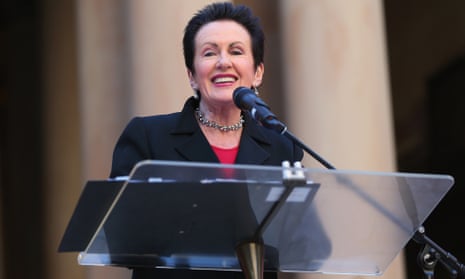The City of Sydney council is set to divest from fossil fuels this year, regardless of the outcome of the election on Saturday, after a two-year campaign by members of the anti-fossil fuel group 350.org.
The council has more than $500m under management. At the last meeting before the election, it unanimously passed a motion calling for a new investment policy that would divert those funds away from banks that invest in fossil fuels.
In 2015 the big four banks – Westpac, ANZ, NAB and the Commonwealth Bank – pumped $5.5bn into the fossil fuel sector, supporting coal, oil and liquefied natural gas in Australia and overseas.
After lobbying from members of 350.org, the lord mayor, Clover Moore, moved a minute calling for a new investment policy that would preference sustainable financial institutions and include coal, gas and oil on its list of “environmentally harmful activities” that should be avoided.
“If re-elected as lord mayor, I commit to directing staff to bring the revised investment policy and strategy to the first ordinary council meeting after the election,” Moore said at the meeting.
Moore told Guardian Australia the council had 56% of its funds invested in the “big four” banks and the rest in 15 different financial institutions. She said it could be challenging to find smaller banks that have divested from fossil fuels to take their large deposits.
“Climate change is the most important issue of our times,” she said. “We urgently need to reduce our greenhouse emissions and move away from fossil fuels to clean energy – but we are currently frustrated by the market offerings for green investments and the ability of smaller banks without loans to fossil fuel projects to accept more of our deposits.”
The recommendations were carried unanimously, with support from Moore’s bloc, as well as the Greens, Labor, Liberal and independent councillors.
Even the Liberal councillor Christine Forster – sister of the former prime minister Tony Abbott and former oil industry journalist – supported the minute, saying in an email to 350.org campaigners that she “will look forward to the policy being brought before the new council”.
Moore said: “I was pleased to get support from all councillors for the policy – I hope the new council will do so as well when the revised investment policy is brought for approval.”
Once the policy is devised, it will need to be approved by the council but the 350.org divestment campaigner Isaac Astill said that would just be an administrative step.
“To have every single member from across the political spectrum vote in support of this; not only is it just an administrative step, we can see it has wide appeal so I think we’ll see it sail through after the election,” Astill said.
When the City of Sydney does approve the new investment policy it will become the largest local council in Australia to divest from fossil fuels, joining 25 others including the City of Melbourne and Hobart city council.
Sydney’s more than $500m in divestment will be about twice that of the next biggest council divestment, Newcastle city council’s $286m.
In August 2015 the Australian Capital Territory moved to divest its $4.5bn from fossil fuels.
Carrie Tsai, 350.org councils divestment coordinator, said the group had targeted the City of Sydney partly because it was large but also because it was recognised around the world. “We identified Sydney city as a very strategic council,” she said.
The activists worked towards the divestment for about two years. Since 2014, they had been supported by the Greens mayoral candidate Irene Doutney and Labor’s Linda Scott, Tsai said. The Clover Moore bloc initially resisted the push to include banks among the institutions from which to divest.
Tsai said Moore had done a lot of work on other sustainability issues. “Divestment is a natural next step in Sydney’s already commendable sustainability policies,” she said.

Comments (…)
Sign in or create your Guardian account to join the discussion